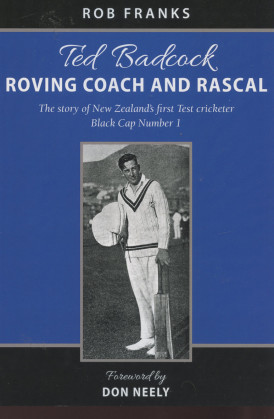Ted Badcock: Roving Coach and Rascal
Martin Chandler |Published: 2019
Pages: 116
Author: Franks, Rob
Publisher: The Cricket Publishing Company
Rating: 4 stars

About a year ago I narrowly avoided embarrassing myself over this one. I had made my regular enquiry about the future plans of The Cricket Publishing Company for my six monthly overview and was told that; Rob Franks is working on a biography of Ted Badcock.
I have known for some time that Franks is one of the foremost New Zealand cricket historians, and it did occur to me as a little odd that he should be researching the life of one of the lesser lights of Australian inter war cricket. I even went so far as to have a quick look at Cricketarchive, which duly confirmed that Badcock had been one of the Australian century makers is the deciding Test in the 1936/37 Ashes series.
The classic mistake I had made was to assume that my initial thought was correct without actually spotting the information, in this case a christian name, which should have put me on the right road. The man I was thinking of was Jack Badcock, a Tasmanian, and not Ted Badcock. Coincidentally the two men, completely unrelated, both had seven Test careers and were to die in 1982. There however the similarities end.
Ted Badcock played his Tests for New Zealand, hence Franks’ interest in him, although he was actually born on the North West Frontier in what is now Pakistan. Badcock, coming as he did from a military background to British parents was educated in England and, leaving school as the Great War began, immediately followed in his father’s footsteps.
During his war service Badcock was a victim of a gas attack but, a period of convalescence from that apart, served his country faithfully. He chose not to be a career soldier however and having little in the way of qualifications opted to concentrate on cricket instead. Badcock’s time in the professional game began in England before he moved on to New Zealand in 1924 and began his First Class career in the 1924/25 season.
A punishing batsman and highly effective medium paced swing bowler Badcock was selected for New Zealand’s inaugural Test during England’s visit in 1929/30. He was to play in six of the next seven as well and whilst his record is modest he enjoyed some success with the ball in that first series, and with the bat in a couple of Tests against South Africa two years later.
In 1934 Badcock returned to England and for the rest of his active cricket career played in the leagues and, showing his passion for the game, continued to do so in the years of the Second World War despite only being able to do so as an amateur. Franks’ research demonstrates that whilst Badcock was not quite at the same level as Learie Constantine he wasn’t far behind the great West Indian.
At some point, Franks was not able to establish exactly when although the available evidence suggests the late 1930s, Badcock also coached in South Africa and the West Indies, and after peace returned he emigrated once more, this time to Perth in Western Australia where he worked with young cricketers for the rest of his career. Badcock was 85 when he died in a Perth nursing home in 1982.
So how interesting is the life story of a man with what is, in relative terms, only a fleeting involvement in cricket at the highest level? It might have been fairly dull, but the depth and quality of Franks’ research is such that the net result is an absorbing biography. That is for two reasons, firstly for the social history that it unearths and secondly because, as the sub-title makes clear, Badcock was no ordinary character.
The relevant military archives are, as they tend to be, excellent sources of information. Badcock’s alma mater of Wellington College in Berkshire assisted Franks as well. Once he arrived in New Zealand Badcock quickly became the subject of some notoriety and soon found himself serving a three month prison sentence. Not a criminal in the true sense Badcock’s crime was to run up a significant amount of debt very quickly which resulted in his being bankrupted and his financial profligacy visited by a criminal sanction. Financial problems, albeit it would seem never of the same gravity again, are issues that seem to have stalked Badcock throughout his adult life.
Married twice, and widowed twice, Badcock had no children himself so there were no surviving descendants available to assist Franks but his diligence has been such that for once that does not really matter. He clearly left no stone unturned and whatever picture of the Badcock personality was created by the documents and archives Franks consulted, with the direct assistance of those who knew him in his years in Perth Franks has been able to portray Badcock the man as well as could reasonably be expected.
As well as being as professionally produced, as all of this publisher’s books are, Franks has managed to locate a significant number of photographs all of which are well reproduced within the book and add greatly to the story. To add to that there is a comprehensive bibliography, index and a statistical appendix, so nothing for a reviewer to carp about.
Inevitably a book such as Ted Badcock: Roving Coach and Rascal is not going to be a best seller and producing an edition limited to 120 copies is not going to generate a significant income for author or publisher, not that that, thankfully, is the motivation for either. Personally I cannot imagine that the 120 will hang around for too long, so an early purchase is recommended. I believe that both Roger Page and Ken Piesse have copies.






Leave a comment